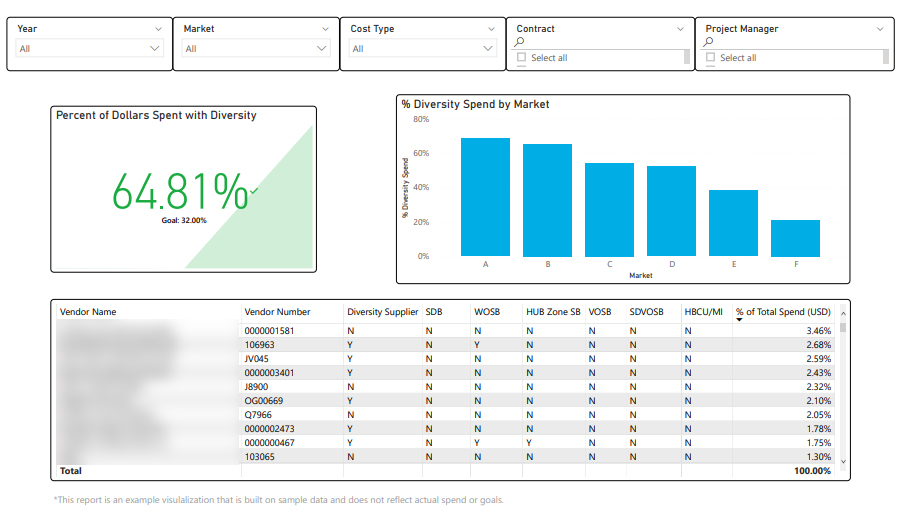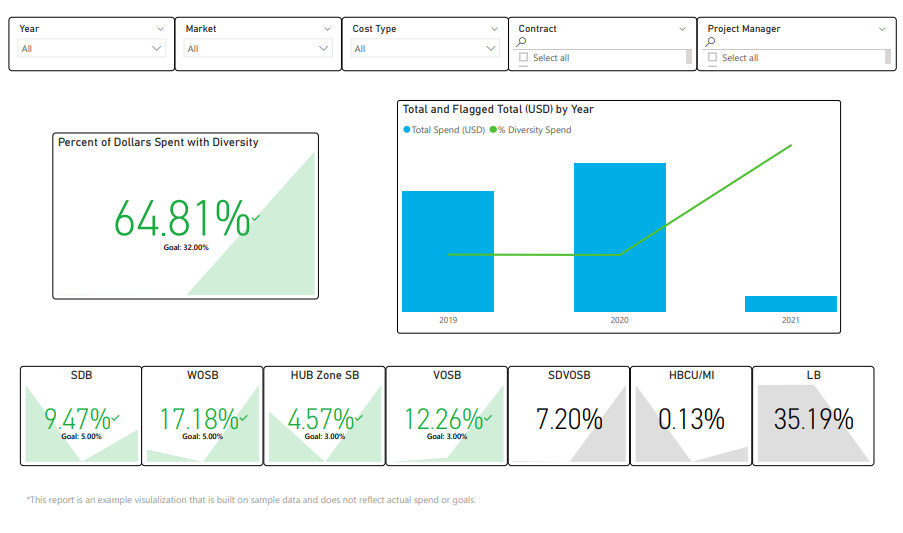
Parsons Supplier Diversity Dashboard
Our Supply Chain Operations, ESG & Marketing Analytics Team, and our Business Intelligence and Analytics groups recently collaborated to build a data-driven solution to promote equity and inclusion while enhancing our Supplier Diversity Program and Diversity as a Core Value.
Why Is Supplier Diversity Important?
A successful Supplier Diversity Program is crucial to our commitment to inclusion and diversity. It plays a vital role in the fight against economic and social inequality by generating opportunities for disadvantaged communities and encouraging diverse businesses’ growth.
Encouraging supplier diversity is not just the right thing to do; it’s also the smart thing to do. Having a diverse supplier base mitigates risk in our supply chain. It cultivates a culture of collaboration and innovation, which benefits our customers and supports the communities in which we serve. A significant component of our diverse supplier base is defined as small businesses. Small business growth is crucial for economic growth and recovery, particularly in the U.S., as the globe looks to rebuild from the COVID-19 pandemic.
What Did We Build?
Managing a Supplier Diversity Program is no easy task. It requires data-driven insights to track our achievements and enhance strategic decision-making. We have maintained a Supplier Diversity Program for decades as part of our Federal Solutions segment. However, expanding this capability and visibility throughout the enterprise prompted our need for a technology solution, which was developed in the form of a dashboard. This new Supplier Diversity dashboard was built for any audience. From a snapshot of enterprise procurement to a program manager assessing contract diversity achievements, the dashboard arms our teams with the data and information needed to quickly make decisions and provide significant benefits to the program’s overall success. We track diverse suppliers in several categories, including: small disadvantaged, women-owned, veteran-owned, minority-owned, and historically underutilized business (HUB) zone small business, just to name a few.

For Everyone: The Big Picture
First and foremost, we needed a report to show us the “big picture.” Each visual was carefully selected for the dashboard, packing in as much analysis and insight into the reports as possible. The key performance indicators (KPIs) encompass three pieces of information: the current diversity spends percentages, goal indicators, and year-over-year trends. Each KPI indicator allows us to see where the money is being spent if spend allocation is aligned with our Supplier Diversity initiatives and if we are improving or declining from previous years. Pairing this with the bar chart that includes total spend year over year, we get an immediate answer to the crucial questions: how much are we spending, and are we meeting our goals?

For Decision Makers: Drill Down Details
For some, the big picture view may be enough. Yet, it takes a lot of pieces to make up the whole puzzle. For us to reach the goals set, we need to empower leaders with tools to make data-driven decisions. Our dashboard allows exported reports and customized views with drill-down capabilities and data points that will enable decision-makers to see their own “piece of the puzzle.” Drilling down into the market, contract, or other levels allows that decision-maker to know where the money is being spent, if the goals are being met, and highlights opportunities for re-allocation to diverse suppliers.
What’s Next?
With any data-driven project, ongoing analysis is key, and the Supplier Diversity Dashboard is no different. As our Supplier Diversity Program and goals evolve, so will our data, research, and reports. The Supply Chain Operations, ESG & Marketing Analytics, and Business Intelligence and Analytics groups will continue to collaborate and innovate to support our ongoing commitment to inclusion and diversity.